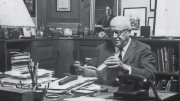This department exists to document and celebrate Harvardiana: Crimson places and people, their customs and crotchets, consequential and otherwise. But on rare occasions, the Pump may be permitted to toot its own horn—in this case, commemorating 85 years of publication in printed form, a longevity increasingly rare in this relentlessly digital era.
It was David McCord, A.B. 1921, A.M. 1922, who first pumped the handle on March 8, 1940, shortly after arriving as acting editor of the Harvard Alumni Bulletin. (Forgiving readers will note that this past spring was, um, a rather newsy one for the alma mater, and so might cut Primus some slack for missing the precise anniversary.) The Bulletin described the new department as “somewhat spasmodic,” but it has mostly been continuous in appearance.
The Pump has weathered well as an outpost of the archaic and the arcane. That reflects its founder’s genius, expressed as only McCord could, when he envisioned “a corner reserved for random comment, for the stray line of Harvard verse, the pleasant non-sequitur of academic observation, the simple fragment or phrase; a niche for the simple story unadorned, for epigram, for the biographical paragraph, for lines from the leaves of some forgotten notebook, for antiquarian illumination,” and more. Amid the rising scale and complexity of organizations like the University, the drive for technological efficiency in everything from its payroll to its pedagogy, and other modern annoyances, the Pump persists as an outpost where Harvard traditions get their due, and the human comedy of the place is rewarded rather than rebuked.
No one has matched McCord in the verse department, as when he captured New England winter economically on March 15, 1940: “In Boston when it snows at night/They clean it up by candle-light;/In Cambridge, quite the other way,/It snows and there they leave it lay.”
Still, the Pump has soldiered on in his spirit. What better account of Harvard’s sometimes maddening pursuit of perfection than the September-October 1983 column on the three hundred or so designs for the guardhouse at Johnston Gate and Harvard Hall by Graham Gund, M.Arch. ’68, M.A.U. ’69 (who died this past June 6, in Cambridge)? (The piece concluded with The Harvard Crimson’s letter on the result from Raggedy Ann and Andy, who inquired about renting the place given the tight housing market.) Is there a more memorable take on the raw (pun intended) silliness of streaking than the April 1974 compendium of footnoted reports, including “Lessons in gross anatomy. A Harvard Medical School anatomy examination was interrupted by two streakers wearing surgical masks”?
One random observation from January-February 1986 conveys just how long it took to build this special center of academic excellence. When the last old white pine to the east of University Hall was felled by Hurricane Gloria in September 1985, Primus consulted Samuel Eliot Morison’s history and discovered President John Thornton Kirkland’s order to plant the grove in 1857—“to screen the long, low outhouse that sheltered the privies.”
Another, from July-August 1996, uncovers what lies at the core of the place’s mission:
“The log of the Harvard University Police Department, published weekly…is usually a recital of trespassing incidents, disturbances of the peace, and the dispossession of bicycles, laptop computers, watches and wallets from overly trusting or distractable members of the…community. This recent entry provided a pleasing change of pace:
‘Screams were heard at Adams House. Units were dispatched, and upon arrival they found a person screaming for joy. The subject had been admitted to graduate school.’”
. . .
Speaking of birthdays, there are now those in the land who seem determined to keep Harvard from reaching its four hundredth anniversary, in 2036—or at least to make the occasion far from celebratory. Like Primuses I-V, this one takes heart from the University’s traditions and values, and the people who uphold them. It says here that the old place will have reasons aplenty to light 400 candles, proudly, 11 years hence. None too soon to prime the pump.









